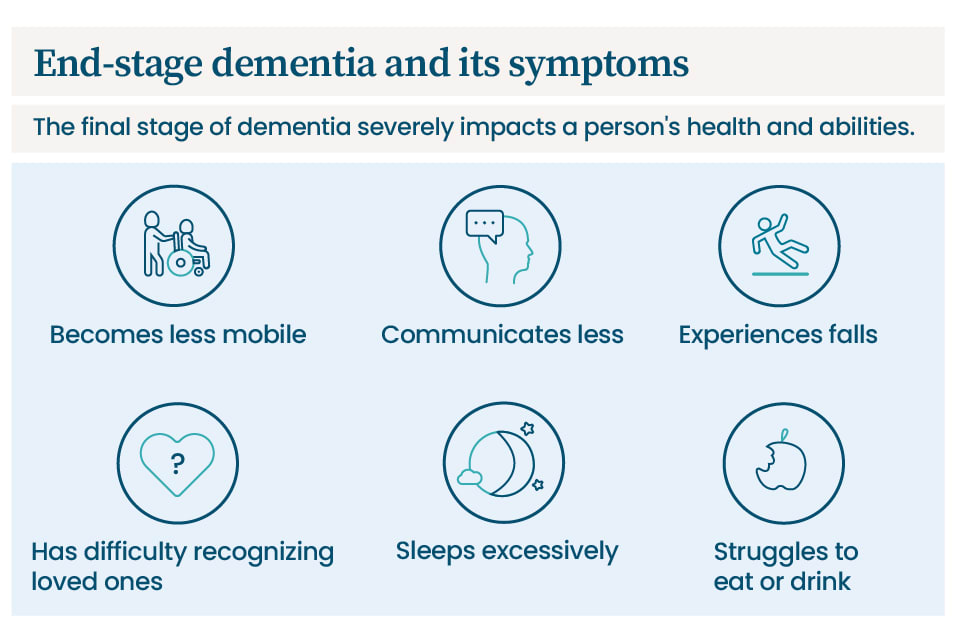Introduction
Embarking on the journey of understanding the 5 stages of dementia last is crucial for both caregivers and those directly affected. This article delves into the unique aspects of each stage, offering valuable insights and support for navigating this challenging terrain.
Unveiling the Path: A Comprehensive Guide to the 5 Stages of Dementia Last
Understanding Dementia’s Final Stages
Navigating the 5 stages of dementia requires profound insights. In this section, we unravel the complexities of each stage, offering clarity on the emotional and physical toll it takes on individuals.
Denial and Isolation
As dementia progresses, the initial stage often involves a sense of denial and isolation. Loved ones may withdraw as they grapple with the diagnosis. It’s essential to foster an environment of understanding and empathy during this challenging phase.
Anger and Frustration
The second stage introduces heightened emotions, with anger and frustration taking center stage. Individuals may struggle with communication, leading to increased frustration. Patience and compassion become paramount for caregivers.
Bargaining and Depression
In the third stage, individuals may attempt to bargain with the inevitable, accompanied by bouts of depression. Addressing these emotions with sensitivity and professional support can significantly impact the quality of life during this stage.
Acceptance and Adaptation
The penultimate stage is marked by acceptance and adaptation. Embracing change becomes key, and a supportive network can ease the transition. This stage underscores the importance of holistic care and emotional well-being.
Reflection and Legacy
In the final stage, reflection becomes a dominant theme. Encouraging individuals to share their legacy and experiences can provide a sense of closure. Creating a supportive environment helps in fostering a meaningful conclusion to this challenging journey.
Insights into the 5 Stages of Dementia Last
Navigating Challenges with Compassion
Sharing personal experiences can shed light on the profound challenges caregivers face while supporting someone in the last stages of dementia. This section combines first-hand insights and expert advice to guide caregivers on this emotional journey.
5 Stages of Dementia Last: A Personal Perspective
Drawing from personal experiences, this section explores the emotional rollercoaster of witnessing a loved one progress through the 5 stages of dementia last. It offers solace to those who may feel alone in their journey.
A Rollercoaster of Emotions
The journey through the 5 stages of dementia last is a rollercoaster of emotions for both the individual and their caregivers. It’s crucial to recognize the emotional toll this process takes and to seek support from professionals and support networks.
Creating Meaningful Connections
Amidst the challenges, fostering meaningful connections becomes essential. Engaging in activities that bring joy and comfort, such as reminiscing about shared memories, can provide solace amid emotional turbulence.
Coping Strategies for Caregivers
Empowering Caregivers with Effective Coping Strategies
Prioritizing Self-Care
Caregivers often neglect their well-being while focusing on the needs of their loved ones. Prioritizing self-care is not only beneficial for caregivers but also ensures they have the emotional stamina to provide the best possible care.
Building a Support System
:max_bytes(150000):strip_icc()/what-is-it-like-to-die-of-dementia-1132331-5b95e1b9c9e77c002c1dadfc.png)
The support system for caregivers is a cornerstone in navigating the 5 stages of dementia last. This section delves into the importance of building a robust support network, including friends, family, and professional caregivers.
Personal Stories of Resilience
Real Stories of Individuals Navigating Dementia’s Final Chapters
Triumphs Amidst Challenges
Sharing stories of triumphs amidst the challenges offers a ray of hope to those grappling with the impact of dementia. These narratives exemplify the strength and resilience of individuals facing the last stages of dementia.
The Power of Music and Memories
One remarkable aspect of dementia care is the positive influence of music and reminiscence therapy. This section highlights personal stories where the power of music and cherished memories has brought comfort and connection.
5 Stages of Dementia Last: Addressing Practical Concerns
Practical Tips for Navigating the Final Stages
Legal and Financial Planning
As dementia progresses, addressing legal and financial matters becomes critical. This section provides practical tips and insights into navigating legal complexities and ensuring financial stability during these challenging times.
Preserving Dignity in Care
Preserving the dignity of individuals in the 5 stages of dementia last is a central theme. This section delves into the importance of respectful care practices, ensuring that each person’s journey is marked by dignity and compassion.
Creating Lasting Memories
Despite the challenges, there are opportunities to create lasting memories. This part explores ways to engage individuals in meaningful activities, fostering moments that become cherished memories for both caregivers and their loved ones.
Advocating for Awareness
Raising Awareness for Dementia Care
The Need for Public Understanding
Public understanding and awareness are crucial in addressing the challenges posed by dementia’s final stages. This section emphasizes the importance of education and advocacy to dispel misconceptions and foster a supportive community.
Supporting Research and Innovation
Advancements in dementia care rely on continuous research and innovation. This part discusses the significance of supporting research initiatives and embracing innovative solutions that enhance the quality of life for individuals facing the last stages of dementia.
Inspiring Hope for Tomorrow
Embracing a Positive Outlook
Finding Joy in Small Moments
Amidst the difficulties, finding joy in small moments becomes a powerful coping mechanism. This section shares stories of individuals and caregivers who have discovered unexpected moments of happiness in the midst of the challenges.
The Importance of Emotional Resilience
Building emotional resilience is essential for individuals and caregivers alike. This segment provides practical tips and insights into fostering emotional strength, ensuring that both the journey and the memories created are imbued with resilience and hope.
Facing the Challenges Head-On
Acknowledging and Addressing Challenges
Addressing Communication Barriers
Communication challenges often intensify in the final stages of dementia. This part explores strategies for overcoming communication barriers, emphasizing the significance of non-verbal cues and active listening.
Coping with Physical Decline
The physical decline associated with dementia’s last stages poses unique challenges. This section discusses approaches to managing physical decline, including adaptive aids, specialized care, and maintaining a comfortable environment.
The Power of Human Connection
Building Meaningful Connections
Fostering Connections Through Storytelling
Storytelling becomes a powerful tool for fostering connections. This segment explores the impact of sharing narratives, not only for reminiscing but also for connecting with others who may be on a similar journey.
The Role of Support Networks
Support networks play a pivotal role in the well-being of both individuals and caregivers. This part highlights the significance of establishing and nurturing support networks, whether through friends, family, or organized groups.
End-of-Life Discussions with Sensitivity
Discussing end-of-life matters requires immense sensitivity. This segment guides caregivers on approaching these conversations with compassion, providing a roadmap for discussing challenging topics with empathy.
The Importance of Empathy
Compassionate care is the cornerstone of supporting individuals in the 5 stages of dementia last. This section explores the significance of empathy in providing comfort and understanding during the challenging moments that arise.
Tailoring Care to Individual Needs
Recognizing that each person’s journey is unique is pivotal. Tailoring care to individual needs ensures that individuals in the final stages receive personalized attention, promoting a sense of dignity and respect.
Enhancing Quality of Life
Innovative Approaches for a Fulfilling Life
The Therapeutic Power of Nature
Bringing nature into the lives of individuals facing the last stages of dementia has therapeutic benefits. This segment explores how exposure to nature, whether through gardens or indoor plants, can positively impact overall well-being.
Integrating Mindfulness Practices
Mindfulness practices, such as meditation and gentle yoga, can contribute to emotional balance and provide moments of tranquility. Caregivers and individuals alike can benefit from incorporating these practices into daily routines.
Addressing Grief and Loss
Navigating the Emotional Landscape of Grief
Anticipatory Grief
Anticipatory grief is a common emotional response for both individuals facing dementia’s final stages and their loved ones. This part delves into the complexities of anticipatory grief and offers strategies for coping with its emotional toll.
Coping with Bereavement
The loss experienced after a loved one passes through the 5 stages of dementia last is profound. This section provides insights into coping with bereavement, emphasizing the importance of seeking support and allowing the grieving process to unfold naturally.
Building Resilience in Caregivers
Supporting Caregivers Through the Journey
Recognizing Caregiver Burnout
Caregiver burnout is a prevalent challenge. This part sheds light on the signs of burnout and offers practical advice on preventing and managing caregiver fatigue, ensuring sustained support for individuals in the last stages of dementia.
The Role of Professional Support
Professional support is invaluable for caregivers navigating the complexities of dementia’s final stages. This segment discusses the role of healthcare professionals, counselors, and support groups in providing assistance and guidance.
Leveraging Technology for Connection
Utilizing Technology to Bridge Gaps
Virtual Communication Tools
In an era of technological advancements, virtual communication tools can bridge the physical gaps between individuals and their families. This section explores how video calls and online platforms facilitate meaningful connections.
Remotely Monitoring Health
Technological innovations allow caregivers to remotely monitor the health of their loved ones. This part discusses the benefits of health-tracking devices and apps, providing peace of mind for caregivers.
Frequently Asked Questions
A: The duration of each stage varies, with some individuals progressing more rapidly than others. It is crucial to focus on individual experiences rather than strict timelines.
Q: Is there a cure for dementia in its final stages?
A: Unfortunately, there is no cure for dementia, especially in its advanced stages. However, various interventions and support systems can enhance the quality of life for both individuals and caregivers.
Q: How can caregivers maintain their well-being during this challenging time?
A: Caregivers must prioritize self-care, seek support from others, and consider professional assistance when necessary. Balancing one’s well-being is crucial for providing effective care.
Q: What role do medical professionals play in the final stages of dementia?
A: Medical professionals offer crucial support, from managing symptoms to providing emotional guidance. Collaborating with healthcare providers is essential for comprehensive care.
Q: How can families prepare for the final stages of dementia?
A: Open communication, advanced care planning, and seeking resources for emotional support are vital steps for families preparing for the final stages of dementia.
Q: Are there innovative approaches to enhance the quality of life in the last stages of dementia?
A: Yes, innovative approaches such as music therapy, reminiscence therapy, and sensory stimulation can significantly improve the quality of life for individuals in the final stages of dementia.
Conclusion
Navigating the 5 stages of dementia last requires a blend of empathy, understanding, and professional support. By acknowledging the unique challenges each stage presents, individuals and caregivers can embark on this journey with resilience and compassion.









